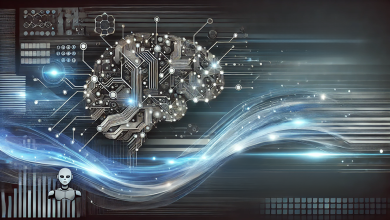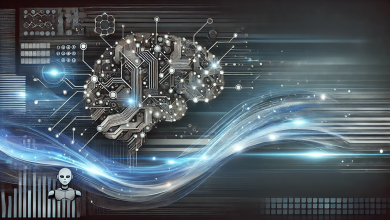Understanding Artificial Intelligence: Benefits and Challenges
Artificial Intelligence (AI) has become one of the most crucial topics in our digital age. It touches every aspect of our lives, from the way we communicate to how businesses operate. The emergence of AI technologies is not just a trend; it’s a transformation that is reshaping economies and societies. This article will unravel the concept of AI, focusing on its benefits and challenges, and guiding you through this intricate landscape.
What is Artificial Intelligence?
Before diving into the benefits and challenges, let’s clarify what we mean by "Artificial Intelligence". Simply put, AI refers to machines designed to perform tasks that typically require human intelligence. These tasks include problem-solving, understanding natural language, recognizing patterns, and learning from experience. AI systems leverage vast datasets to make decisions, improve performance, and create innovative solutions.
Types of Artificial Intelligence
There are two primary types of AI: Narrow AI and General AI.
-
Narrow AI: This type of AI is designed to perform a narrow task, such as facial recognition or internet searching. Most AI systems today fall into this category.
- General AI: Although still largely theoretical, General AI refers to a machine’s ability to understand and reason across a variety of tasks, much like a human.
Benefits of Artificial Intelligence
AI brings numerous benefits that can enhance various aspects of life and work. Here are some significant advantages:
1. Enhanced Efficiency
AI systems can process information and complete tasks significantly faster than human counterparts. For instance, in data analysis, AI tools can sift through terabytes of data in seconds, providing insights that would take humans weeks or even months to uncover.
2. Improved Accuracy
When implemented correctly, AI minimizes human error. For example, in medical diagnostics, AI algorithms have shown greater accuracy in identifying diseases from medical images than human doctors.
3. Cost Savings
By automating repetitive tasks, businesses can reduce labor costs and allocate resources more effectively. Tools like robotic process automation (RPA) can take over mundane tasks, freeing up human workers to focus on higher-value activities.
4. Personalization
AI enables a level of personalization that enhances user experiences. For example, recommendation engines used by platforms like Netflix and Amazon analyze user behavior to suggest movies or products tailored to individual tastes.
5. 24/7 Availability
Unlike human workers, AI systems don’t need breaks or sleep. This constant availability is particularly useful in industries like customer service, where chatbots can provide immediate assistance at any time.
6. Predictive Analytics
AI can analyze historical data to make predictions about future trends. In fields like finance and marketing, organizations utilize AI to forecast sales, assess risks, and optimize strategies.
7. Innovation Acceleration
AI fosters innovation by enabling new business models and products. Startups and established companies alike are leveraging AI to develop smarter applications, from autonomous vehicles to AI-powered medical devices.
Challenges of Artificial Intelligence
Despite its many advantages, the rise of artificial intelligence is not without challenges. Here are some of the key issues:
1. Ethical Concerns
AI raises important ethical questions, including privacy concerns related to data collection and usage. As AI systems require vast amounts of data, how that data is handled poses serious ethical dilemmas.
2. Job Displacement
As AI systems become more capable, there is a growing fear of job displacement. While AI creates new opportunities, it also has the potential to render certain jobs obsolete, leading to unemployment in specific sectors.
3. Bias and Fairness
AI algorithms can inadvertently perpetuate biases present in their training data. If the data used to train AI systems reflects societal biases, the results may also be biased, leading to unfair treatment in areas such as hiring or law enforcement.
4. Dependence on Technology
As we integrate AI into various aspects of life, there’s a risk of becoming overly dependent on technology. This reliance could lead to skill depletion among the workforce and critical vulnerabilities in key sectors.
5. Security Risks
AI systems can be targeted for manipulation or hacking. As AI technology evolves, so do the threats and vulnerabilities, making it crucial for organizations to implement strong security measures.
6. Lack of Regulation
The rapid development of AI technologies outpaces regulatory frameworks. There is a pressing need for laws and guidelines that govern the ethical use of AI, ensuring that it benefits society without causing harm.
Tools and Resources for Understanding AI
To further your knowledge about artificial intelligence, here are some helpful resources:
-
Coursera: Offers various AI and machine learning courses from leading universities. Check out Coursera AI Courses.
-
Kaggle: A platform for data science and machine learning competitions. Engage with real datasets and models on Kaggle.
- Wikipedia: For a comprehensive overview, you can visit the Wikipedia page on Artificial Intelligence.
Frequently Asked Questions
What is the main goal of artificial intelligence?
The main goal of AI is to create machines that can perform tasks that ordinarily require human intelligence, enhancing efficiency and accuracy in various applications.
How does AI impact the job market?
AI can lead to job displacement in some sectors while creating new opportunities in others, requiring a shift in skill sets for the workforce.
What are the ethical implications of AI?
Ethical implications involve issues like data privacy, bias in decision-making, and the need for regulations to ensure fair use of AI technologies.
Conclusion: Navigating the Future of AI
Artificial Intelligence is a powerful tool that presents significant benefits and challenges. Understanding its implications is crucial for adapting to a future where AI plays an integral role. As you navigate this terrain, keep in mind the importance of ethical considerations and the need for continuous learning and adaptation.
Whether you’re a student, a professional, or simply a curious individual, embracing AI can open up new avenues for personal and professional growth. As we stand on the brink of this technological revolution, stay informed and proactive about leveraging AI responsibly to shape a better future.
By being aware of its capabilities and the associated challenges, you can be better prepared to engage with this transformative technology in intelligent and ethical ways.

